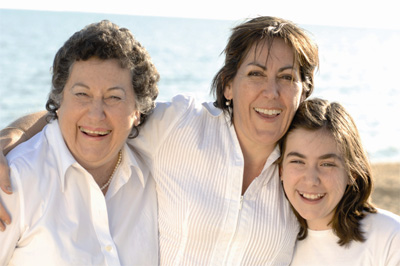Things To Tell Your Daughter, Or Ask Your Mother, About Women's Health

Things To Tell Your Daughter, Or Ask Your Mother, About Women's Health
As a woman, knowing some key things about your mother's life journey can give you an idea of what to expect and what to keep an eye on. Some important questions to ask her are:
'When did your periods start?"
Girls in Australia mostly start their menstrual periods at around 12-13 years old, but if your mother started hers earlier it's likely that you will too.
'What have your periods been like?"
Women can experience periods very differently. Your best -crystal ball' is your mother. Ask if her periods are/were regular, if her bleeding was heavy or light when she was your age (it can change over time) and if she had much pain just before or during her periods.
'When did you go through menopause?"
Your final menstrual period (menopause) is likely to happen at a similar age to your mother's. If her periods stopped spontaneously (not due to surgery, chemotherapy or radiotherapy) before age 45, ask a doctor about protecting yourself against long-term health risks such as osteoporosis and heart disease.
'Do we have a family history of any disease?"
Your chance of developing common gynaecological conditions like endometriosis or polycystic ovary syndrome (PCOS) is higher if a close female relative has it. Many older women may still not know they have particular conditions, so ask if your mother has/had a lot of pain with her periods, if she had any problems getting pregnant, or if she has trouble managing her weight or body hair.
'Have you ever suffered from depression?"
Depression can run in families, but this doesn't mean that if your mother has experienced depression you automatically will. If she has, ask when and for how long. You may experience something similar, particularly if her mood was affected by her menstrual cycle, but your own life events and lifestyle (drug and alcohol use, physical activity, social support) are also important factors.
'Have you ever had high or low blood pressure?"
If your mother had high or low blood pressure later in life, it could well be lifestyle related, but if she was quite young it's something you should ask your doctor to keep an eye on.
Download a free eBook full of tips from real Australian women to future generations at www.jeanhailes.org.au/resources/what-australian-mums-wish
Published with the permission of the Jean Hailes Foundation for Women's Health
Tollfree number 1800 JEAN HAILES (532 642) for women seeking further health information www.JeanHailes.org.au
MORE
- Menstrual Period Management
- The Secret to Weight Loss
- Feeling The Pain: How To Tackle Period Pain
- Period Pain and How to Survive It
- Gender Specific Medicine
- Helping Women To Start Those 'Difficult'...
- Michelle Boyd Ellura Interview
- Menopause Does Not Protect Women From Cervical...
- Five Ways to Balance Hormones
- Do You Really Know What Is Going On Down There?
- Do You Know Your Breasts?
- Dr. Stan Goldstein Sexual Health Choices Interview
- Breast Health Decision Question and Answers
- Breast Cancer Treatment Impacts Patients' Sex...
- Bladder Weakness More Common Than Hay Fever
- Belinda Reynolds How To Manage UTI's Naturally...
- Treat Bones Like Breasts
- Mammogram Technology
- Soodox for Women
- Chlamydia Most Commonly Reported STI In Australia
- Time For Reflection Is Great For Mental Health



